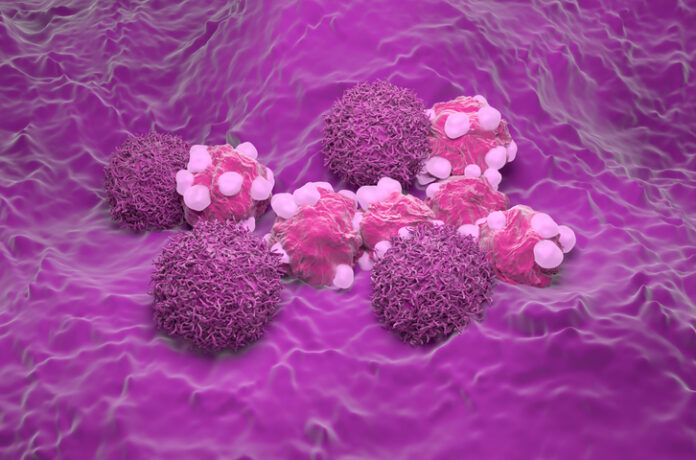Health
New Nanogel Vaccine Offers Hope for Cervical Cancer Treatment

Researchers at Chiba University have developed an innovative intranasal vaccine that could potentially treat cervical cancer caused by human papillomavirus (HPV). This new approach, which uses a nanogel delivery system, aims to activate the immune response directly in the nasal mucosa, a significant advancement in addressing the limitations of current treatments.
The study, led by associate professor Rika Nakahashi-Ouchida and her colleague Hiromi Mori, was published in the journal Science Translational Medicine. The research, titled “Cationic nanogel–based nasal therapeutic HPV vaccine prevents the development of cervical cancer,” demonstrates how this vaccine can slow tumor growth in preclinical models.
Cervical cancer is one of the most prevalent cancers among women globally, primarily resulting from persistent infections with high-risk strains of HPV. While existing prophylactic vaccines can prevent infection, they do not address already established infections or HPV-related cancers. The authors of the study note that “therapeutic vaccines against cervical cancer caused by human papillomavirus (HPV) are still an unmet medical need.” Current treatment options, including surgery, chemotherapy, and radiotherapy, often pose significant risks, including potential impacts on fertility.
To bridge this gap, the research team developed a nasal vaccine utilizing cationic cholesteryl-group-bearing nanogels (cCHP) designed to deliver HPV antigens directly to the nasal mucosa. The positively charged nanogels adhere to the negatively charged surfaces in the nasal cavity, providing a gradual release of the antigen. This vaccine specifically targets the E7 oncoprotein produced by HPV16, a prevalent high-risk strain that disrupts the tumor suppressor protein pRb, crucial in cervical cancer progression.
The formulation, consisting of the E7 antigen and cyclic-di-AMP (c-di-AMP)—an adjuvant known for enhancing T-cell immunity—was tested intranasally on mice and macaques. In mice, the vaccine significantly reduced tumor growth and stimulated E7-specific CD4+ and CD8+ T cells within cervicovaginal tissue. In macaques, administration of four doses using a human-compatible nasal spray device elicited robust immune responses in cervical tissue, sustaining elevated levels of E7-specific killer T cells four months post-treatment.
“We have developed an intranasal therapeutic vaccine as a nonsurgical alternative to conventional treatments that can compromise women’s quality of life,” stated Nakahashi-Ouchida. The vaccine’s ability to activate mucosal homing pathways for lymphocytes is a pivotal advancement, as it initiates an immune response in the cervical mucosa.
The implications of these findings extend beyond just cervical cancer. The research suggests that nasal vaccine delivery can stimulate mucosal immunity in the reproductive tract, leveraging the respiratory-reproductive axis—a concept previously validated by the team in models involving herpes simplex virus.
Cervical cancer remains a critical global health issue. According to the World Health Organization, approximately 670,000 new cases and 350,000 deaths were reported worldwide in 2022, making it the fourth most common cancer among women. The burden of this disease is particularly severe in low- and middle-income countries, where access to HPV vaccination, screening, and treatment options is severely limited.
These statistics underscore the urgent need for therapeutic approaches that extend beyond prevention. The work from Chiba University emphasizes the potential of nanogel-based nasal vaccines to transform cervical cancer treatment. By combining local immune activation with a non-invasive delivery system, this method offers a promising alternative that could preserve fertility and enhance the quality of life for those affected.
Nakahashi-Ouchida added, “Immunotherapies such as intranasal therapeutic vaccines may help establish a new category of noninvasive treatment.” This research could pave the way for further applications in preventing recurrences and managing chronic diseases, providing patients with safer and more accessible options. While further clinical testing is essential, these promising findings mark a significant step forward in expanding the role of immunotherapy from prevention to treatment, heralding a new era of mucosal-targeted vaccines.
-

 Top Stories1 month ago
Top Stories1 month agoNew ‘Star Trek: Voyager’ Game Demo Released, Players Test Limits
-

 World4 weeks ago
World4 weeks agoGlobal Air Forces Ranked by Annual Defense Budgets in 2025
-

 World1 month ago
World1 month agoMass Production of F-35 Fighter Jet Drives Down Costs
-

 World1 month ago
World1 month agoElectrification Challenges Demand Advanced Multiphysics Modeling
-

 Science1 month ago
Science1 month agoTime Crystals Revolutionize Quantum Computing Potential
-

 Business1 month ago
Business1 month agoGold Investment Surge: Top Mutual Funds and ETF Alternatives
-

 Top Stories1 month ago
Top Stories1 month agoDirecTV to Launch AI-Driven Ads with User Likenesses in 2026
-

 Entertainment1 month ago
Entertainment1 month agoFreeport Art Gallery Transforms Waste into Creative Masterpieces
-

 Lifestyle4 weeks ago
Lifestyle4 weeks agoDiscover Reese Witherspoon’s Chic Dining Room Style for Under $25
-

 Health4 weeks ago
Health4 weeks agoGavin Newsom Critiques Trump’s Health and National Guard Plans
-

 Business1 month ago
Business1 month agoUS Government Denies Coal Lease Bid, Impacting Industry Revival Efforts
-

 Lifestyle4 weeks ago
Lifestyle4 weeks agoLia Thomas Honored with ‘Voice of Inspiration’ Award at Dodgers Event








